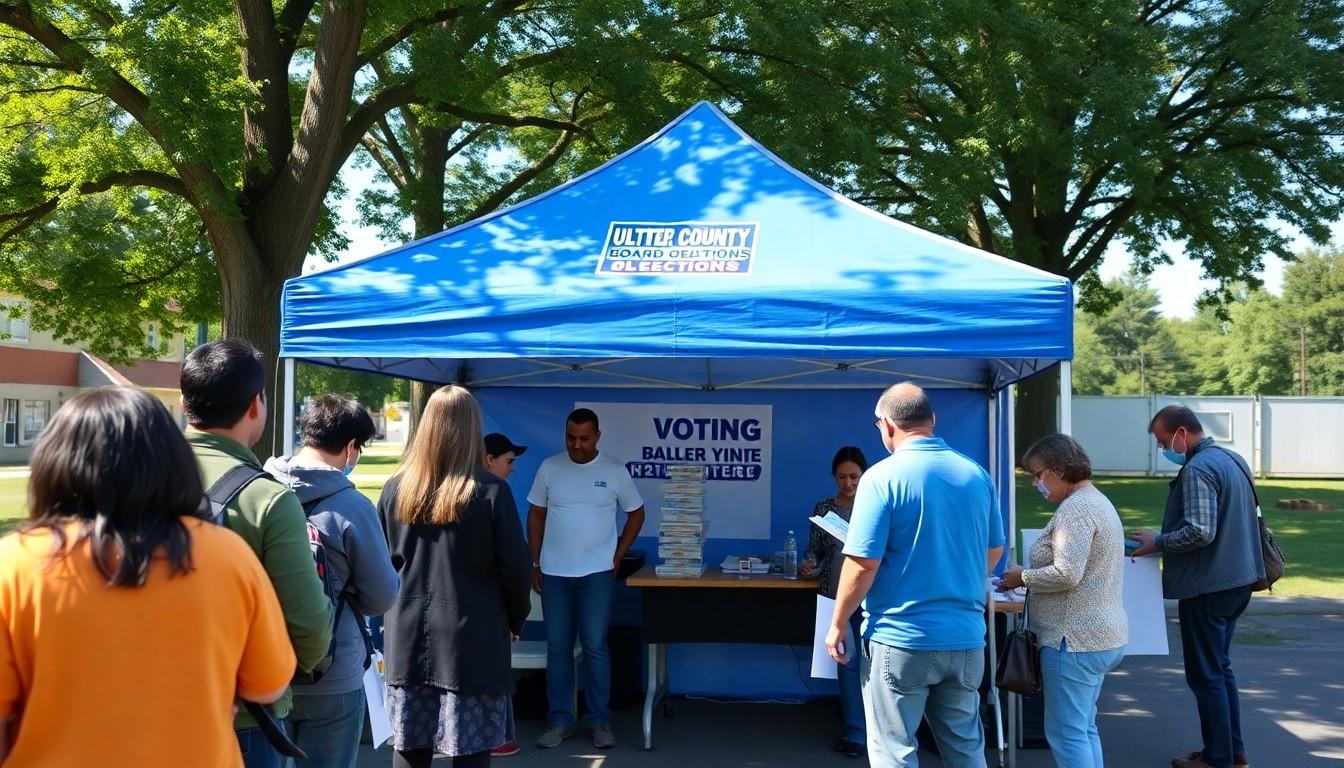When it comes to elections, Ulster County’s Board of Elections is like the referee in a championship game—essential, often overlooked, and sometimes the subject of a few good-natured grumbles. This team of dedicated professionals ensures that every vote counts and every ballot is treated with the utmost care. They’re the unsung heroes behind the scenes, making sure the electoral process runs smoother than a well-oiled machine.
Navigating the world of voting can feel like trying to solve a Rubik’s Cube blindfolded. But fear not! The Ulster County Board of Elections is here to guide voters through the maze of registration, polling places, and those ever-elusive absentee ballots. With their expertise, voters can focus on what really matters—casting their vote and making their voices heard. So, let’s dive into the ins and outs of this vital institution that plays a crucial role in democracy.
Table of Contents
ToggleOverview of Ulster County Board of Elections
Ulster County’s Board of Elections oversees the electoral process, ensuring transparency and accuracy. This organization manages voter registration, maintains voting records, and schedules elections. Professionals within the Board dedicate themselves to counting votes and upholding election integrity.
Absentee ballots present an essential service. Voters unable to attend polling places rely on this option to ensure their participation. The Board simplifies this process, providing clear information on how to request and submit ballots.
Polling places receive careful consideration. The Board strategically selects locations to ensure accessibility for all voters. Understanding the significance of convenience, they continuously assess these sites based on community feedback.
Election days involve rigorous preparation. Board staff train poll workers, ensuring they understand their roles and responsibilities. In doing so, they promote effective communication and assistance for voters.
Outreach initiatives play a key role. The Board educates the public on changes in voting laws and the voting process itself. They host informative sessions to clarify voter rights and registration requirements.
Results reporting remains a priority. After each election, the Board promptly tallies and publishes results, maintaining public trust. Voters depend on timely information, making this transparency crucial.
Engagement with community organizations enhances outreach efforts. Collaborating with local groups helps the Board reach diverse populations. Increased awareness supports higher voter turnout, promoting active civic participation.
Overall, the Ulster County Board of Elections serves as a cornerstone of democracy. Its commitment to facilitating a smooth electoral process fosters trust and encourages civic engagement among residents.
Role and Responsibilities

The Ulster County Board of Elections plays a critical role in maintaining the integrity of the electoral process. Responsibilities encompass election administration, voter registration, and public outreach.
Election Administration
Election administration involves planning and executing all steps necessary for conducting elections. It manages logistics for polling places, ensuring they meet accessibility standards. Workers receive comprehensive training to effectively assist voters on election days. Streamlined procedures for equipment setup and ballot counting help maintain efficiency. The Board monitors voting to ensure compliance with laws and regulations. Timely reporting of results enhances public trust. Thorough evaluations follow each election to assess processes and identify areas for improvement.
Voter Registration
Voter registration remains a key function of the Board. It facilitates an easy process for individuals to register, ensuring access for all eligible residents. Various outreach initiatives inform the public about registration deadlines and requirements. Online registration options streamline submissions, while in-person assistance is available for those needing help. It verifies registration applications, maintaining accurate voter rolls. Regular updates keep the information current and relevant. By simplifying the registration process, the Board promotes civic participation and strengthens democracy in Ulster County.
Recent Developments
Recent developments in Ulster County’s Board of Elections highlight significant changes and advancements in their operations.
Changes in Election Laws
Recent modifications in election laws impact the procedures followed by the Board. New regulations facilitate absentee voting for voters impacted by emergencies. Voter ID requirements have been updated, easing the identification process. Provisions now allow for online voter registration, which encourages broader participation. Furthermore, the incorporation of early voting opportunities has expanded access to the electoral process, allowing voters to cast their ballots in a timeframe that aligns with their schedules. These changes aim to enhance voter engagement and improve the overall voting experience within the county.
Technology Integration
Advancements in technology shape the operational framework of the Ulster County Board of Elections. Recent upgrades to voting equipment enhance accuracy and efficiency during elections. The introduction of online systems streamlines voter registration and ballot tracking. Digital tools assist in maintaining up-to-date voter databases, reducing discrepancies in voter rolls. Data analytics technologies support better decision-making and resource allocation for election management. Additionally, training programs updated with technology integrations ensure that poll workers are equipped to assist voters effectively. These innovations reinforce the Board’s commitment to transparent and modern electoral practices.
Performance and Accountability
The Ulster County Board of Elections emphasizes its performance and accountability in managing elections effectively. Transparency remains essential in building public trust.
Voter Turnout Trends
Voter turnout trends have demonstrated significant fluctuations in Ulster County in recent elections. According to recent data, turnout rates for presidential elections frequently exceed 70 percent, while midterm elections tend to see around 40 percent participation. The Board actively analyzes these trends to identify factors influencing voter participation. Engagement initiatives target underrepresented populations, addressing barriers to ensure equitable access to the electoral process. In 2020, the introduction of mail-in voting options significantly boosted participation, proving the relevance of adaptive strategies in encouraging civic involvement.
Election Security Measures
Election security measures play a vital role in maintaining integrity at the polls. The Ulster County Board implements several protocols to safeguard the electoral process. Physical security at polling places includes surveillance and secure ballot storage. Additionally, the Board employs advanced technology to protect voting systems from potential cyber threats. Regular risk assessments identify vulnerabilities, ensuring prompt remediation. Election staff receive comprehensive training on security practices and incident reporting. Overall, these proactive measures contribute to a secure voting environment, fostering public confidence in election outcomes.
Community Engagement
Engagement with the community plays a crucial role in the effectiveness of the Ulster County Board of Elections. Various outreach programs inform residents about important voting procedures and deadlines. Engagement initiatives involve partnerships with local organizations to reach underrepresented populations.
Volunteers contribute significantly to promoting civic participation. They assist with events that inform voters about registration and electoral processes. Celebrating events like National Voter Registration Day encourages residents to register and participate in elections.
Informational campaigns utilize social media platforms to reach a broader audience. Regular updates on registration options, polling places, and absentee voting simplify the process for voters. Early voting opportunities open the door for more individuals to cast their votes conveniently.
Education about the electoral process fosters a sense of community ownership in the voting system. Workshops provide insights into the importance of voting, especially among young voters. Engaging parents and teachers ensures that younger generations understand their rights and responsibilities.
Feedback loops create an avenue for community members to express their concerns and suggestions. Outreach efforts also include surveys that assess voter satisfaction and areas for improvement. Collaboration with community leaders reinforces trust and openness between the Board and residents.
Overall, community engagement not only enhances voter participation but also strengthens the democratic process. Each initiative and outreach program aims to empower citizens by ensuring they feel informed and valued in the electoral process.
The Ulster County Board of Elections plays a vital role in ensuring a fair and transparent electoral process. Their commitment to accessibility and community engagement empowers residents to participate actively in democracy. With ongoing innovations in technology and outreach efforts, the Board continues to adapt to the needs of voters. By fostering trust and providing essential services like absentee voting and online registration, they enhance the overall voting experience. As the Board navigates the complexities of election administration, its dedication to integrity and public service remains a cornerstone of democratic participation in Ulster County.





